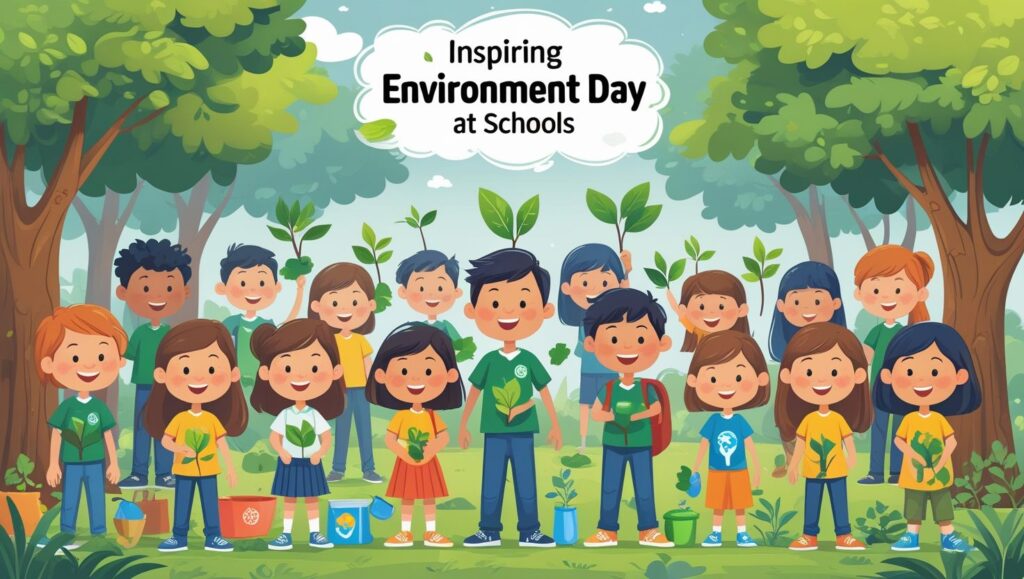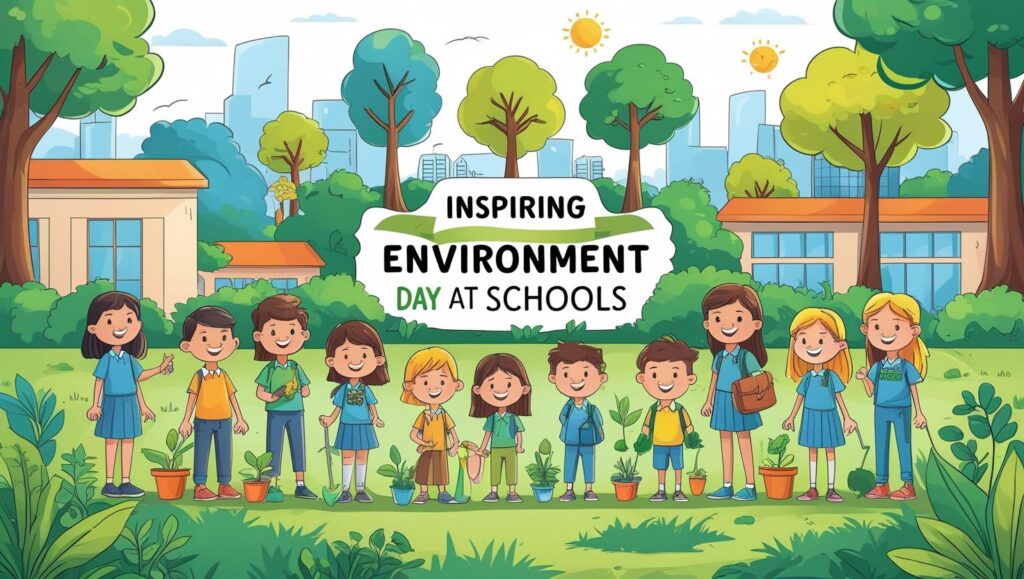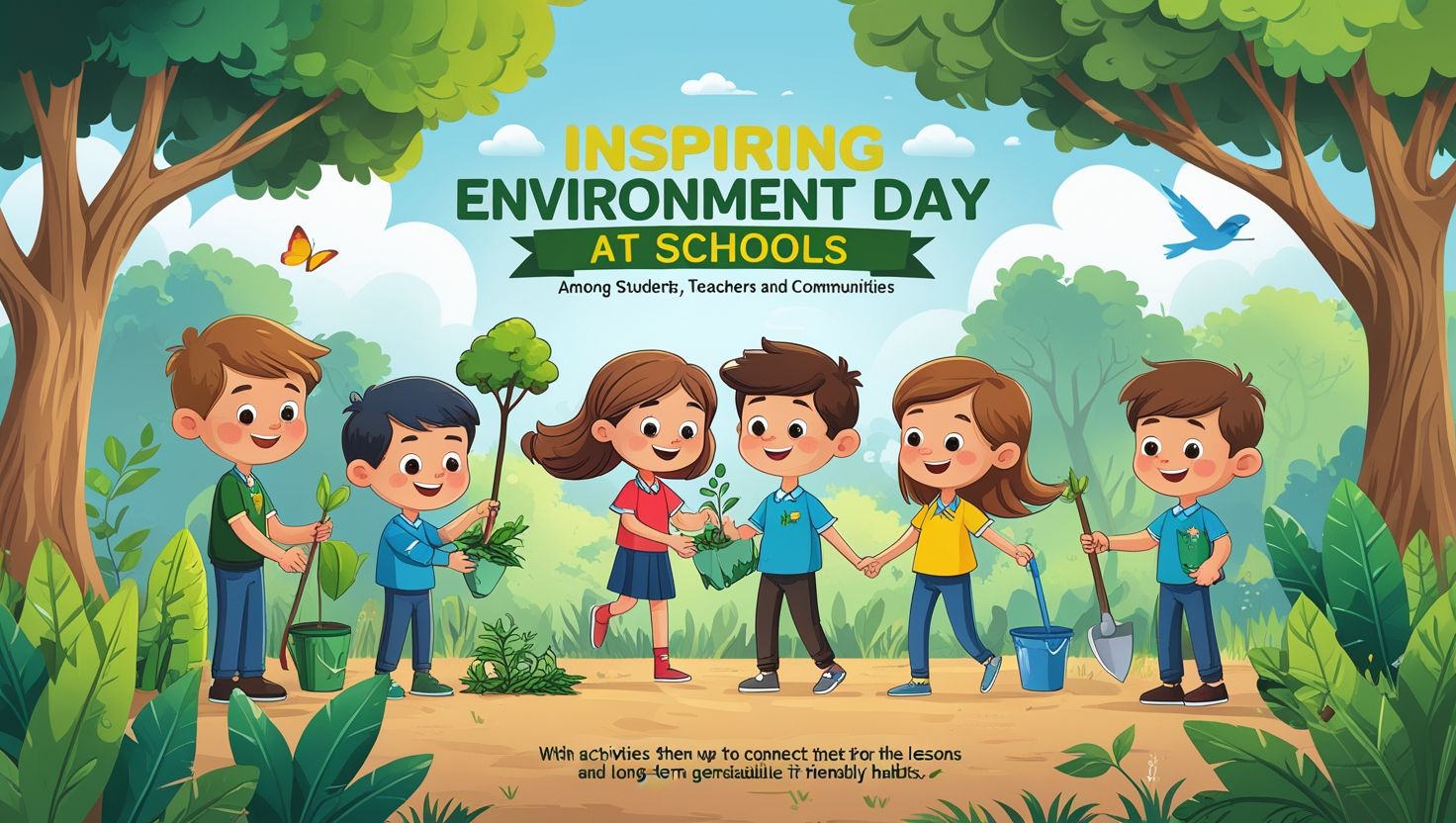Introduction
Inspiring Environment Day at Schools, Environment Day in schools is an inspiring event that brings students, teachers, and communities together for a noble cause. It is celebrated every year with the aim of raising awareness about the importance of protecting nature. Schools play a vital role in shaping young minds, and therefore, they serve as the perfect platform to highlight environmental concerns. Moreover, celebrating Environment Day encourages learners to think beyond their textbooks and explore real-world issues. Teachers, through various activities, help children connect with the earth and understand their responsibility.
In addition, it provides opportunities for students to develop leadership, creativity, and social responsibility. The celebration becomes even more powerful because it combines fun, education, and practical experiences. Thus, Environment Day is not only a special occasion but also a learning journey that promotes a culture of sustainability. Schools that actively celebrate it ensure that their students grow into environmentally responsible citizens. Consequently, this day inspires hope, awareness, and positive action in the entire school community.
Importance of Celebrating Environment Day in Schools
Celebrating Environment Day in schools is extremely important because it raises awareness at a very early stage. Students, when guided properly, become the voice of change in their families and communities. In addition, schools act as learning centers where knowledge transforms into action. By organizing such events, schools emphasize the urgent need to save resources, reduce pollution, and protect biodiversity. Furthermore, these celebrations connect classroom lessons with practical applications.
Students do not just read about deforestation, climate change, or waste management; instead, they participate in activities that address these issues. For example, tree-planting drives and recycling projects show them how their small actions can bring big results. Another important aspect is that celebrating Environment Day fosters teamwork, empathy, and global responsibility. Children begin to value the planet and realize their role in protecting it. Therefore, this occasion becomes a stepping stone toward building eco-conscious generations. Without such celebrations, the gap between knowledge and action would remain wide.

Activities on Environment Day in Schools
On Environment Day, schools organize a wide variety of activities that inspire both students and teachers. One of the most common activities is tree planting, where every child participates in nurturing the earth. Additionally, schools arrange art competitions, essay writing, and debates that encourage learners to express their ideas creatively. Many schools also conduct awareness walks in nearby communities, allowing students to spread the message of sustainability. Moreover, recycling projects are introduced where children learn to reuse waste materials in innovative ways. Teachers often guide students in preparing posters and charts highlighting environmental problems and solutions.
Another inspiring activity is a clean-up drive, in which students clean their school premises and surrounding areas. Through these tasks, they learn the value of responsibility and teamwork. Furthermore, cultural programs such as plays and songs with environmental themes add excitement to the celebration. Thus, a combination of education and fun makes Environment Day memorable and meaningful. Each activity strengthens awareness and motivates action.
Role of Teachers in Inspiring Students
Teachers play a central role in making Environment Day meaningful for students. They guide, motivate, and encourage learners to actively participate in all activities. In addition, teachers link classroom subjects with environmental issues to make the learning experience more practical. For example, science teachers discuss pollution and conservation methods, while art teachers inspire students to express environmental themes through drawings. Moreover, teachers set examples by showing eco-friendly habits such as reducing plastic use or conserving water.
These small practices have a great impact on young learners. Another important role of teachers is to create opportunities for critical thinking. They ask students questions that make them reflect on their responsibilities toward nature. Furthermore, teachers encourage teamwork by assigning group projects and presentations. Through their support and leadership, children feel more confident and inspired to take action. Ultimately, teachers act as role models, shaping the attitudes and values of students. Without their guidance, the celebration would lack direction and depth.
Involvement of Students in Environment Day
Students are at the heart of Environment Day celebrations in schools. Their energy, creativity, and curiosity make the event vibrant and inspiring. They take part in a variety of activities, ranging from planting trees to performing skits on environmental themes. Moreover, students often volunteer in clean-up drives and recycling projects, which give them practical exposure to sustainability. Their involvement is not limited to participation alone, as many also take leadership roles. For instance, student groups often plan awareness campaigns, design posters, and speak during school assemblies.
Furthermore, students become ambassadors of change by sharing what they learn with their families and communities. They encourage their parents to adopt eco-friendly practices, thus multiplying the impact. Additionally, involvement in such activities nurtures important skills such as communication, leadership, and teamwork. As students experience real-life environmental challenges, they develop empathy for the planet. Consequently, their active participation ensures that Environment Day goes beyond symbolic gestures and results in real change.

Community Participation in School Celebrations
Environment Day becomes even more impactful when the wider community participates in school celebrations. Parents, local leaders, and organizations often join hands with schools to promote environmental awareness. Their involvement provides additional resources and stronger support for the cause. For instance, community members may donate plants, arrange awareness sessions, or sponsor eco-friendly materials for students. Moreover, their participation allows students to witness how environmental protection is a collective responsibility.
Teachers and students working alongside parents create a sense of unity and cooperation. Furthermore, inviting environmental experts and local activists for lectures or workshops enriches the learning experience. These guests share real-life stories and inspire students with practical solutions. Additionally, community members can join clean-up campaigns and tree-planting drives, making the event more impactful. Such collaborations also strengthen the bond between schools and communities. Therefore, by involving the wider society, Environment Day becomes more than a school event; it becomes a shared movement that benefits everyone.
Long-Term Benefits of Environment Day
Celebrating Environment Day in schools creates long-term benefits that go far beyond a single day. Firstly, it instills eco-friendly values in students that shape their future choices. As they grow older, these students carry forward sustainable habits in their daily lives. Secondly, schools that consistently celebrate this day build a strong culture of responsibility toward nature. Over time, this culture spreads from classrooms to homes and communities. Moreover, Environment Day celebrations help develop essential life skills in students, such as teamwork, leadership, and problem-solving.
These skills prove useful in many aspects of their academic and personal growth. Furthermore, long-term benefits include increased awareness of pressing global issues like climate change and pollution. By understanding these challenges early, students are better prepared to find solutions in adulthood. In addition, the green initiatives started on Environment Day, such as planting trees, often result in lasting environmental improvements. Ultimately, the event contributes to creating future citizens who value and protect the planet.
Conclusion: Inspiring Future Generations
In conclusion, Environment Day at schools is much more than an annual event; it is an inspiring journey of awareness and action. By engaging students, teachers, and communities, it promotes environmental responsibility in a creative and meaningful way. Moreover, the activities organized during this day connect theory with practice, making learning more impactful. Teachers guide students with dedication, while students participate with enthusiasm, creating a powerful combination. Furthermore, community involvement strengthens the message and extends its influence beyond school walls.
The celebration also ensures long-term benefits, as students develop sustainable values and life skills. Importantly, Environment Day fosters unity, cooperation, and hope for a greener future. It reminds everyone that small efforts, when combined, lead to big changes. Therefore, celebrating Environment Day in schools is essential for inspiring future generations to protect the planet. By keeping this spirit alive, schools contribute not only to education but also to global sustainability and well-being.

Istanbul boat tour Our guide answered all our questions patiently. https://dashboard.crypto1001.com/?p=1133
bxtceb
Wow! Aftsr all I got a wweb site from where
I ccan actually get helpful facts concerning my study and knowledge. https://glassi-india.mystrikingly.com/